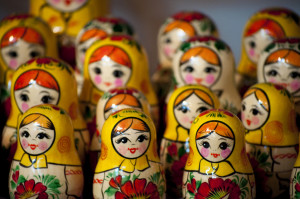Russia is still quite a conservative and patriarchal society: men and women might have equal legal and economic rights, but there are clearly defined social roles, which may sometimes be constrictive (source: WayToRussia).
Economic rights
Women make 46.9% of the employed population in Russia. The greatest proportion of working women are in public health service (85%), education (81%), credit and finance (78%), information and accounting services (75%), whilst the lowest share is in the construction industry (22%). The majority of working women are trapped in low-wage areas, such as medicine, education, and clerical jobs.
There are protective laws prohibiting too hard jobs for women, such as carrying too heavy weights, or working at night. You’ll see many women, though, working in the shops and in the metro past midnight: the law allows ‘temporary’ contracts for such jobs. Pregnant women or women with a child 1 to 3 years of age are strictly forbidden to work at night. When a pregnant woman leaves her job to give birth and look after her child, there is a requirement for a 3 year-paid maternity leave for child care. Therefore young women are often discriminated when applying for a job for that reason.
Women make 45% of the unemployed population.
The age for pension is 55 years old for women, and 60 for men. However State pensions are usually 10000 R / month ($200) which is barely enough to eat for one month. Consequently many old women find little jobs to earn a bit more.
Marriage, surnames
The legal marrying age is 18 years old for both men and women, but it is possible under some special circumstances for a girl to marry at 16 of age.
Property acquired by spouses during marriage is their joint property, unless stipulated differently in a contract between spouses.
The spouses can share their surnames after the wedding. The husband can take the surname of his wife or vice-versa. The surname of a man is feminised with the suffix -a to become a woman’s surname: for example if the husband is called Smirnov, the wife can change her surname to Smirnova. The spouses can also keep their original names. After divorce names can be kept or recovered.
In Russia, children are usually given a name, and a patronymic (derived from the name of their father). For example Anna has a father called Petr Pushkin, she will be called Anna Petrovna Pushkina. Her brother will be called Stepan Petrovitch Pushkin. People use more often their patronymics than their surname to present themselves in official meetings.


